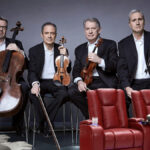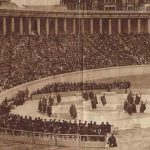Concerts were longer in the time of Beethoven, as were attention spans. But even by those standards, the storied program he organized for Vienna’s Theater an der Wien on Dec. 22, 1808 was over the top. Called the Akademie, it ran from 6:30 to 10:30 pm in two parts and included the premieres of the Fifth and Sixth Symphonies, Fourth Piano Concerto, Choral Fantasia in C minor, and other works by Beethoven.
The hall was extremely cold that evening (Vienna was experiencing a particularly nasty cold snap) and some of the pieces were insufficiently rehearsed (one soprano had a particularly bad case of stage fright). Nevertheless, it was the event was historic, in part because it would be Beethoven’s last public performance in a piano concerto.
The conductor Louis Langrée has recreated this program on a couple of occasions – most recently at the 2007 Mostly Mozart Festival – and is slated to do so again (twice!) with the Cincinnati Symphony, on February 29 and March 1. I recently spoke with Langrée for the February issue of BBC Music Magazine‘s North American section. Below is a portion of the interview, which has been lightly edited for clarity and length.
You’ll be conducting the Cincinnati Symphony in a recreation of Beethoven’s storied Akademie concert, which took place over the course of four hours. Why did Beethoven put together such a massive program?
Part of it was strategic. Beethoven, even if he was so admired, felt a little bit neglected in Vienna. Napoleon’s brother, Jerome Bonaparte, who was king of Westphalia, had offered him a position as Kappelmeister at his castle. Beethoven wanted to organize a farewell concert to Vienna, as a kind of demo of all his skills — as a pianist, an improviser, and composer of every possible genre. This [concert aria] “Ah perfido!” speaks of the sorrow of departure, of saying goodbye to your beloved one. So that could be a metaphor for Beethoven saying goodbye to Vienna. Prince Lobkowitz gave him money after this concert to keep him in Vienna. And he stayed in Vienna.
Beethoven also used the concert to highlight his work as an improviser. How do you recreate this aspect?
The two last times I did this concert, the pianists were playing the Fantasia Beethoven wrote right after this concert. Many musicologists imagine that this Fantasia was written after his improvisation. But here, pianist Inon Barnatan will improvise. He’s thrilled by this idea. So you will definitely hear contemporary music. You will hear something with all of the characteristics of an improvisation [Barnatan also plays Beethoven’s Fourth Piano Concerto].
How do you pace yourself for a four-hour-plus concert, even given the long break you’ve inserted for dinner midway through?
Every time that I propose this program, musicians are quite intimidated: ‘How can we play that long?’ But it puts you in such a special energy level that the more you give, the more energy you have. Of course we’ll have an untraditional rehearsal schedule, and then at the moment, there is no other way to do it but to give your best. I always feel with Beethoven, if you give a lot of energy, it’s fine, but it’s just not enough. With Beethoven you have to give too much energy.
Is there a lesson in this concert for musicians, perhaps to experiment more with concert formats?
Totally, and this is part of it. Just last weekend in Cincinnati we premiered Christopher Rouse’s final symphony [after a performance of] Boléro by Maurice Ravel. Normally, you program a new piece at the beginning of the concert and then people who don’t like contemporary music have to be a little bit patient, because at the end they will get the Boléro and they can give the standing ovation. We did exactly the opposite, and it was amazing.
Read the full conversation in the Feb. 2020 issue of BBC Music Magazine.
Top photo: Beethoven statue in Bonn, Germany (flickr/ollily)








Leave a Reply